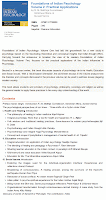
Philosophy, Education and Indian Value System
Desh Raj Sirswal
**** eARTICLES FOR DOWNLOAD ****
eARTICLE SIZE: 309 KB; 28 pages; US$ 2
Ó Desh Raj Sirswal 2011
Philosophy is a way of being in the world of questions, interacting with it, and responding to it. Human mind is an ongoing dialogue about the topics of philosophy such as good and evil, right and wrong, truth and falsity, appearance and reality. Education refers to an act or experience that has a formative effect on the mind, character, physical ability of an individual. Values are whatever an individual desires, prefers and likes. In context of present education system moral, cultural and spiritual values should be preferred. New Education Policy of India should be built on the foundation of ancient spiritualistic, modern culture and technical sophistication. It should develop scientific temper and spirit of inquiry in the students also.
The present work entitled, “Philosophy, Education and Indian Value System” is an attempt to relate philosophy, education and values at the same ground, so that they can perform the conception of complete education. Here we have three chapters i.e. (i) Philosophy and Values in School Education of India, Sri Aurobindo’s Philosophy of Education and Spiritual Approach to Education: An Indian Experience, respectively. I would like to thank my students and colleagues of Milestone Education Society (Regd.) Pehowa for their full time support and corporation in our educational programmes.
In our culturally diverse society, education system should foster universal and eternal values, oriented towards the unity and integration of our people. Such value-education should hold eliminate obscurantism, religious fanaticism, violence, superstitions and fatalism. For this purpose philosophy and values become the primary concern. Presently various dimensions of individual and social development, social transformation, value- acquisition etc., have been well identified in present time for education for a developing nation. We are of the opinion that Indian education should aim at producing men and women of knowledge, cultural values and trained skills to achieve excellence in their personal, professional and social life. An ideal system of education would provide an environment and framework that will facilitate an harmonious blending of presumptions. Teachers and education administrators have to play key role for the pursuit of truth and harmony. None of these pursuits can be meaningful or fruitful unless these are voluntary. The spirit of liberty is a necessary condition for the search for truth and for securing cooperation, mutual progress; goodness and feeling can only be achieved by a good education system.
The personal, professional, social and political environment of our lives is getting more complex and challenging. Present students will have to face certain moral situations in future in which they will have to take decisions regarding their lives instead of depending on others. It is also necessary and important that students should take moral decisions for themselves. Relevance of teaching philosophy and values to school children arises due to current scenario of our country. India has profound positive content based on our heritage, national goals, and universal perceptions. One may give the examples of thinkers like Sri Aurobindo, Mahatma Gandhi, Dr B.R. Ambedkar, J. Krishnamurti, Raman Mahrishi and other social thinkers and educationist for this noble purpose, as they are the principal contributors of our modern wisdom.
Philosophers and behavioural scientists can surely attempt to find practical ways in which people may be inspired to become altruistic and moral. Government, Universities, and other organizations like UGC, ICPR, NCERT should promote such types of researches. Some peoples may have disagreements on what we have said in previous chapters holding the view that till a total and radical social and Cultural Revolution drastically changes the actual socio-economic conditions. For this noble purpose more attention and importance should be paid to non-religious, socio-political thinking while dealing with the educational courses at all level of Indian education-system. Any conclusion from this dialogue will only tentative, leaving adequate scope for dialogue continuation. Solutions of problems raised in this process should be beneficial for our system and this aspect should be constantly examined in the process of continuing dialogue.
DESH RAJ SIRSWAL: Assistant Professor (Philosophy), Post Graduate Govt. College for Girls, Sector-11, Chandigarh. He is also Programme Coordinator, Centre for Positive Philosophy and Interdisciplinary Studies (CPPIS), Milestone Education Society (Regd.), Pehowa (Kurukshetra). Associate Member of The Council for Research in Values and Philosophy, Washington, D.C.
Citation Details:
| Philosophy, Education and Indian Value System By Desh Raj Sirswal |
| Unit Price :$ 2.00 |
| Author :DESH RAJ SIRSWAL |
| No. Of Pages :28 Publisher: COOPERJAL LIMITED, 35 Ravenscroft Avenue, London
NW11 8BH United Kingdom |
Book can be downloaded from:
http://www.ideaindia.com/product_detail.php?pid=1926




